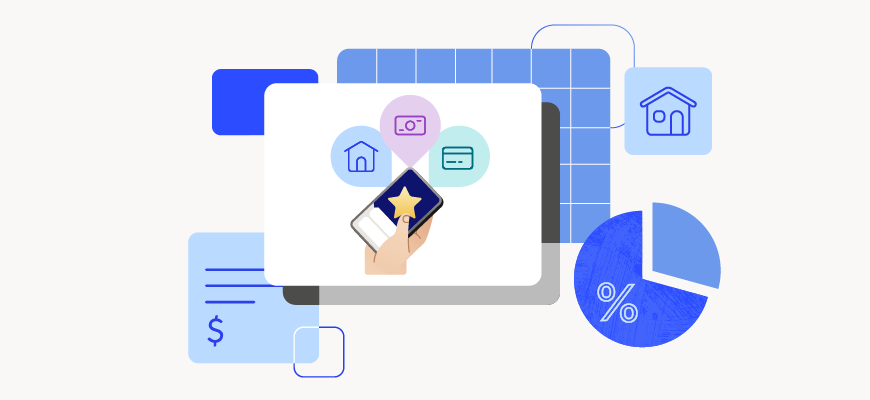Quite often, the terms pre-qualified and pre-approved are used interchangeably. While they mean similar things, it’s important to be able to recognize the difference between the two.
It’s usually much easier and much faster to get pre-qualified for a mortgage, as it’s a less complicated process. Getting pre-approved, is a more involved process, so it typically takes longer than getting pre-qualified, however it provides you with a much more concrete and reliable idea of what you can afford to spend on a property.
That being said, neither guarantee mortgage financing, especially if anything major changes with your financial situation or credit report.
What Does it Mean to be Pre-Qualified?
Being pre-qualified for a mortgage is a way to get a rough idea about how much you can afford to spend on a home. However, it’s not a guarantee of mortgage financing; far from it.
Because getting pre-qualified only gives you an estimate of how much you can spend, you usually don’t need to provide any documentary evidence of things like your income, your ability to make a downpayment, or your credit score.
Is Pre-Qualified a Guarantee?No, being pre-qualified for a mortgage does not mean that you’re guaranteed mortgage financing. Being pre-qualified is often the first step in the mortgage approval process, but it’s not the only step. The lender still needs to do its due diligence, which involves verifying your income, credit, down payment and the property itself. If any of those items change or present an issue, it could lead to your mortgage application being declined in the mortgage approval stage.
Being pre-qualified for a mortgage is a way to get a rough idea about how much you can afford to spend on a home, but if you’re serious about buying a home, you should take the next step and get pre-approved for a mortgage before going out and looking at properties.
Can You be Denied After Pre-Qualification?Yes, you can be denied a mortgage after you have been pre-qualified. Being pre-qualified for a mortgage only gives you a rough idea how much you can afford to spend on a home. The lender doesn’t look at the important stuff like your income, credit report and down payment in great detail.
If anything changes with your financial situation between getting pre-qualified and making an offer on a property, it could lead to your mortgage application being declined. For example, if you quit your job, take on any new debt, or your credit score takes a significant dip. All of these things can affect how much you can qualify to spend on a property.
Can you Make an Offer on a House with a Pre-Qualification?Yes, you can make an offer on a house with only a pre-qualification, but it’s not recommended. As getting pre-qualified doesn’t involve a verification of your income, financial situation or credit score, it’s really only good for getting a rough estimate of how much you could afford to spend on a home. If anything changes with your financial situation since getting pre-qualified, or any issues arise with verifying the information you provided when getting pre-qualified, your pre-qualification will likely no longer be valid. That’s why it’s pretty risky to make an offer on a property when you’re only pre-qualified.
An exception might be if you see your dream home and you have to make an offer that night, but even then you should be cautious about making an offer with only a pre-qualification. In order to make an offer with more certainty, you should invest the time in getting a mortgage pre-approval before going out house-hunting.
Home sellers want to make sure that you’re serious about buying a home. As such, going in with only a mortgage pre-qualification might actually hurt your chances of getting the house. Home sellers like to see a mortgage pre-approval before you make an offer, as this shows that you are prepared and that your offer is reliable.
What Documents Does the Lender Need for Pre-Qualification?The documents you need to provide to get a mortgage pre-qualification depend on the lender that you’re applying to, but most don’t require many, if any at all.
If you’re getting your pre-qualification from an online calculator, you won’t need any documents. You can simply enter your income and other financial numbers relevant to your situation and the calculator will spit out a number telling you how much you can roughly afford to spend on a home.
If you’re doing a pre-qualification over the phone, again, you usually won’t need to provide any documents. You’ll likely need to provide some basic information, such as your income and any debts.
At most, you might be asked to provide a letter of employment and most recent pay slip. You won’t need to provide a copy of your credit report as a mortgage pre-qualification does not include a credit check.
Will Pre-qualification Hurt My Credit?No, a mortgage pre-qualification will not hurt your credit score. Unlike a mortgage pre-approval, a mortgage pre-qualification does not involve reviewing your credit report. As such, it has no impact on your credit score.
However, if you’re serious about buying a home in the future, you should definitely review your own credit report so that you can spot any issues that might be dragging your score down. You can access your credit report for free through Borrowell.
Ready to get your credit score?
Sign up for Borrowell to get your free credit score. That's right. For free.
Get Your Credit Score
What Does it Mean to be Pre-Approved?
Being pre-approved is a step above being pre-qualified. When you are serious about buying a home, that’s when you want to consider getting pre-approved. A pre-approval provides you with a more exact and reliable amount that you might be able to afford to spend on a home. It also involves the lender collecting more details from you, so you can better rely on it more when making an offer on a home.
Is a Pre-Approval a Hard Credit Check?Before we talk about whether a mortgage pre-approval is a hard credit check, it’s important to understand the difference between a hard credit check and a soft one. Soft credit checks (like the ones you do yourself when you check your own score with Borrowell) do not affect your credit score, while hard ones do.
Your credit score is one of the most important factors in deciding how much your cost of financing will be. That’s why we want to try to protect it and have as few hard credit checks on your report as possible. Having too many credit checks on your report can signal to potential lenders that you’re desperate for credit and therefore in a shaky financial situation.
A mortgage pre-approval does involve a hard credit check, so it’s best to only apply for pre-approval when you’re really serious about house-hunting.
Can you be Denied for a Pre-approved Loan?It doesn’t happen very often, but it’s possible to be denied for a pre-approved mortgage home loan.
The primary reasons why your pre-approved mortgage might later be denied are:
If your financial situation or credit score have considerably changed since the pre-approval
You’ve taken on extra debt since pre-approval
There are issues with the property appraisal
What Credit Score is Needed for Pre-Approval?If you’re looking to be pre-approved by a prime lender, generally you need a credit score of at least 680 to receive the lender’s best interest rates. This generally goes for a conventional mortgage (when you are putting down at least 20%).
If you are taking out an insured mortgage and putting down less than 20%, that’s when you might be able to get away with a lower credit score. You might be able to be pre-approved with a prime lender with a credit score of 600 or 620.
What Happens After a Pre-Approval?After you are pre-approved for a mortgage, you can go house-hunting. However, it’s important to remember that a mortgage pre-approval isn’t a guarantee of mortgage financing.
For that reason, you might still want to include a condition of financing with any offers that you make on homes that you’re interested in. That way you’re protected in case your mortgage isn’t approved later on. Once you make an offer on a home and it’s accepted, the lender will do a final review of your finances before issuing a mortgage commitment. That way if anything has changed with your finances, you are protected.
At this time, you can review other mortgage options and interest rates and make your final decision and the lender you want to move forward with.
How Long Does the Pre-Approval Process Take?A mortgage pre-approval can be done in as little as one or two business days. If you have all your documents ready, a mortgage pre-approval can be done pretty quickly, depending on how busy the lender is.
If you are an employee, you want to have a recent letter of employment and pay slip ready. If you are self-employed, you want to have your last two years of notices of assessment and tax returns ready. If you are incorporated, you want to have your corporate financials ready for the last two years, in addition to your personal tax returns.
It’s also helpful to have your down payment documents ready, such as bank statements proving that you have the money to cover the amount.
Can You Get Two Pre-Approvals at the Same Time?Yes, you can. There’s nothing stopping you from getting two mortgage pre-approvals at the same time. In fact, it’s a good idea to do your due diligence and get a mortgage pre-approval with more than one lender. That being said, you don’t want to go overboard.
As mentioned above, every time you are pre-approved for a mortgage, it counts as a hard check on your credit report, and these can have a negative effect on your credit score. As such, you want to try to limit those these. Too many hard hits within a short timespan can really drag down your credit score, which is not ideal when applying for a mortgage.
Which is Better: Pre-Qualified or Pre-Approved?
One is not better than the other. Being pre-qualified and pre-approved are similar, but different things.
If you’re only considering buying a home and you’re looking for a quick estimate of how much you might be able to afford to spend, that’s when getting pre-qualified can make sense.
If you’re actually ready to start looking at homes and you’re more serious about purchasing, that’s when being pre-approved for a mortgage is important.
The Bottom Line
In conclusion, pre-qualifying and pre-approving for a mortgage are two different processes with different levels of commitment and detail involved. Pre-qualifying is a great first step if you're just considering buying a home, but pre-approval is the best way to get a concrete idea of what you can afford when house-hunting. Because the pre-approval process involves a hard credit check and more in-depth documentation, it's important to make sure you're ready before taking that step.













